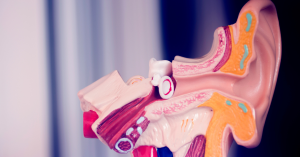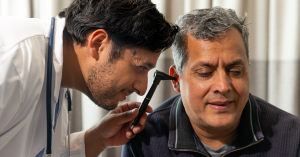One moment, you’re hearing normally. The next—everything feels muffled, distorted, or eerily silent in one ear. If your hearing has ever changed suddenly, it’s not just alarming—it could be a sign of a serious medical condition.
While some causes of hearing shifts are minor, others can lead to permanent hearing loss if not treated within 24 to 72 hours. That’s why knowing what to do when hearing changes suddenly is not just helpful—it could be the difference between full recovery and lasting damage.
In this article, we’ll guide you through the warning signs, possible causes, emergency steps, and treatment paths for sudden hearing loss. Whether it’s a clogged ear or a medical emergency, this guide will help you take the right action at the right time—and protect your hearing for life.
Understanding Sudden Hearing Changes
Sudden changes in hearing can be jarring, confusing, and easy to dismiss—especially if they’re painless or only affect one ear. But in many cases, they’re anything but harmless. Knowing what to look for can help you decide whether to rest, rinse, or rush to urgent care.
What Counts as Sudden Hearing Loss?
Sudden hearing loss, medically known as sudden sensorineural hearing loss (SSHL), is defined as:
A rapid loss of hearing
Occurring in one or both ears
Developing over a period of less than 72 hours
Usually affecting at least 30 decibels over three connected frequencies (measured in audiological testing)
It can happen when you wake up, during a conversation, or even mid-sentence — making it particularly shocking and unsettling.
But not all sudden hearing changes are true SSHL. You might also experience temporary hearing changes due to:
Earwax impaction
Fluid buildup from a cold or allergy
Sudden pressure changes (e.g., flying, diving)
Still, the only way to tell the difference is with an urgent medical evaluation. Any noticeable hearing loss that appears suddenly should be treated as an emergency until proven otherwise.
Common Symptoms and Early Red Flags
Aside from hearing loss itself, you may also notice:
A blocked or full feeling in one ear
Tinnitus (ringing or buzzing)
Vertigo or balance issues
Muffled or distorted sound quality
A sensation that sounds are “distant” or “hollow”
Sometimes, symptoms are subtle. People might think their ear is “clogged” or that they’re just tired — delaying treatment.
Early action is critical: The sooner you respond, the better your chances of recovering your hearing fully.
Up next, we’ll explore the medical causes of sudden hearing loss, from infections to trauma and medication side effects.
Possible Causes of Sudden Hearing Loss
When your hearing drops unexpectedly, it’s tempting to hope it will resolve on its own. But the cause could range from minor and treatable to serious and urgent. Identifying the trigger is key to finding the right treatment—and knowing when time is of the essence.
Medical Conditions and Ear Infections
Several health issues can lead to sudden changes in hearing, including:
Sudden Sensorineural Hearing Loss (SSHL)
This is a medical emergency, typically due to inner ear nerve damage from viral infections, blood flow disruptions, or autoimmune disorders. It often affects just one ear.Ear Infections (Otitis Media or Externa)
These can cause conductive hearing loss from fluid buildup or swelling, especially in children or during/after a cold.Vestibular Neuritis or Labyrinthitis
These inner ear infections or inflammations cause sudden hearing loss, vertigo, and imbalance—often mimicking more severe neurological events.Ménière’s Disease
Characterized by episodic vertigo, tinnitus, and fluctuating hearing, this condition can cause sudden hearing shifts that come and go.Acoustic Neuroma (Vestibular Schwannoma)
A benign tumor on the hearing and balance nerve can cause sudden hearing loss, tinnitus, and unsteadiness, especially on one side.
Trauma, Noise Exposure, and Medications
Other causes may include:
Acoustic Trauma
Sudden exposure to loud noise (like an explosion, gunfire, or concert) can instantly damage inner ear hair cells.Barotrauma
Rapid changes in pressure from air travel, diving, or altitude shifts can rupture the eardrum or damage the middle ear structures.Ototoxic Medications
Certain drugs — such as chemotherapy agents, diuretics, and some antibiotics — can damage the inner ear and lead to sudden or gradual hearing changes.Head Injury
Trauma to the skull can damage hearing structures or nerves, even without obvious ear injury.Circulatory Disorders
Reduced blood flow to the inner ear from stroke, clotting disorders, or vascular inflammation can cause sudden hearing loss—especially in older adults or those with cardiovascular risks.
Sudden hearing changes should never be ignored, even if they seem minor. Early diagnosis helps doctors distinguish between temporary blockages and potentially permanent inner ear damage — guiding how fast and aggressively treatment needs to begin.
Next, we’ll break down why sudden hearing loss is considered a medical emergency, and what doctors check during diagnosis.
Why Sudden Hearing Loss Is a Medical Emergency
While many hearing problems develop gradually, sudden hearing loss is a different beast. It’s not just inconvenient — it can be a sign of nerve damage, inflammation, or even stroke, and the window for successful treatment is often only 24 to 72 hours.
The Risks of Delaying Treatment
Studies show that individuals who receive treatment for sudden hearing loss within the first 48 hours have significantly better outcomes than those who wait. Here’s why:
Sensorineural hearing loss — the most common cause of sudden changes — involves damage to inner ear hair cells or the auditory nerve.
These structures do not regenerate, meaning any delay can make the damage irreversible.
The longer the auditory system goes without clear signals, the harder it becomes to restore function, even if inflammation or infection resolves.
Delaying care risks:
Permanent hearing loss
Development of chronic tinnitus
Ongoing balance and spatial orientation problems
Missed diagnosis of underlying conditions (like autoimmune disease, tumor, or stroke)
In short: the sooner you seek help, the more likely you are to regain your hearing fully.
What Doctors Look for in Diagnosis
When you report a sudden hearing change, an ENT (ear, nose, and throat specialist) or audiologist may:
Perform a hearing test (audiogram) to measure thresholds
Run a tuning fork test to differentiate between conductive and sensorineural causes
Check for earwax, fluid, or infection
Order imaging tests (MRI or CT scan) if neurological or structural issues are suspected
Take a full medical history, especially for signs of vascular, autoimmune, or infectious diseases
If the loss is sensorineural, doctors typically initiate high-dose corticosteroid treatment immediately — either oral or injected — to reduce inflammation and preserve hearing.
Next, we’ll cover the most important part: what to do immediately when you notice sudden hearing changes, including what not to try at home.
What to Do Immediately After Noticing Hearing Changes
If your hearing drops suddenly, time is critical. Whether it’s complete loss, muffled sound, or strange distortions in one or both ears, the first 24–72 hours are your best chance to restore hearing. Every moment counts.
First Steps to Take at Home
Here’s what to do the moment you notice something is wrong:
1. Stop What You’re Doing and Listen Carefully
Try covering one ear at a time to compare hearing between ears. Note whether the issue is in one or both ears, if it came on instantly or gradually, and whether you feel pressure, pain, or dizziness.
2. Avoid Loud Sounds or Headphones
Your auditory system may be highly sensitive or damaged. Exposure to loud noise can worsen hearing loss or cause permanent damage.
3. Avoid Self-Treatment With Cotton Swabs or Liquids
Don’t insert anything into your ear or use unprescribed drops — especially if you can’t tell whether the problem is external blockage or internal damage.
4. Stay Calm but Act Fast
If hearing hasn’t returned after a few minutes, don’t “wait and see.” Even painless loss may indicate something serious.
When and Where to Seek Urgent Care
You should seek urgent medical attention within 24 hours if:
You suddenly lose hearing in one or both ears
Sounds seem distorted, distant, or muffled without a clear cause
You hear a loud “pop” followed by silence or ringing
You experience tinnitus, vertigo, or a feeling of fullness in your ear
Where to go:
Urgent Care if it’s after hours or you can’t see your primary doctor immediately
ENT Specialist (Otolaryngologist) as soon as possible
Emergency Room if you also experience severe vertigo, double vision, facial drooping, or signs of neurological symptoms
Insist on a hearing test and prompt evaluation, even if staff aren’t sure whether it’s an emergency. You know your body — and you can advocate for your ears.
Up next, we’ll explore treatment options, including medications, recovery timelines, and what to expect long-term.
Treatment Options and Long-Term Outlook
The key to successful treatment of sudden hearing loss is acting fast — but what happens once you’re in a doctor’s care? Fortunately, many people can regain all or part of their hearing with the right approach. But outcomes depend on timing, cause, and individual factors.
Steroids, Therapies, and Specialist Care
Once serious causes like stroke or tumor are ruled out, the most common treatment for sudden sensorineural hearing loss (SSHL) is a course of corticosteroids, such as prednisone.
Treatment options include:
Oral steroids: Typically prescribed for 1–2 weeks to reduce inflammation in the inner ear.
Intratympanic steroid injections: Delivered directly into the middle ear through the eardrum for patients who can’t take oral steroids or when oral meds are ineffective.
Antiviral or antibiotic treatment: Used if a viral or bacterial infection is suspected.
Treatment of underlying conditions: Autoimmune disorders, blood pressure problems, or vascular issues may also need management.
Hearing aids or cochlear implants: If hearing does not recover, assistive devices can help restore function and quality of life.
Many patients recover at least some hearing within 2 to 6 weeks, though others may experience partial or permanent loss.
Protecting Your Hearing After Recovery
Whether you regain full hearing or not, it’s important to protect your ears moving forward:
Avoid loud noise exposure — especially during recovery
Use hearing protection when needed (concerts, machinery, travel)
Get regular hearing checkups, especially after sudden events
Treat colds and ear infections promptly
Stay aware of early signs of relapse or changes in the unaffected ear
If permanent loss occurs, rehabilitation options like auditory training, lip reading classes, or assistive devices can help you adapt and thrive.
Conclusion: When Hearing Changes Suddenly, Every Minute Counts
Hearing doesn’t usually fade like a dimmer switch. When it drops off suddenly — whether it’s a dramatic loss or subtle shift — it’s your body’s way of saying something isn’t right. And in many cases, time is everything.
If your hearing changes abruptly, don’t assume it’s earwax, allergies, or temporary congestion. While those are sometimes the cause, they’re not worth guessing over — especially when prompt treatment could restore your hearing entirely.
Act fast. Seek expert care. And remember: the sooner you respond, the greater your chance of recovery.
Because when it comes to hearing, silence isn’t golden — it’s a warning.
FAQs About Sudden Hearing Changes
Is sudden hearing loss a medical emergency?
Yes. Sudden hearing loss—especially if it occurs in one ear—can indicate serious inner ear or neurological issues and should be treated within 24 to 72 hours for the best chance of recovery.
What causes sudden changes in hearing?
Common causes include viral infections, blood flow problems, trauma, ear infections, or reactions to ototoxic medications. Only a specialist can determine the exact cause.
Can earwax cause sudden hearing loss?
Yes. A sudden blockage from earwax impaction can cause temporary conductive hearing loss. However, it’s essential to rule out more serious causes first.
What should I avoid if my hearing suddenly changes?
Avoid loud noises, headphones, cotton swabs, or ear drops unless prescribed. Do not wait it out—get evaluated by a medical professional right away.
What tests diagnose sudden hearing loss?
Tests include an audiogram, tuning fork tests, and possibly MRI or CT imaging to rule out tumors, inner ear damage, or nerve inflammation.
Can hearing come back after sudden loss?
Yes—if treated quickly, many people experience partial or full recovery. Early use of steroids dramatically improves the chances of regaining hearing.






